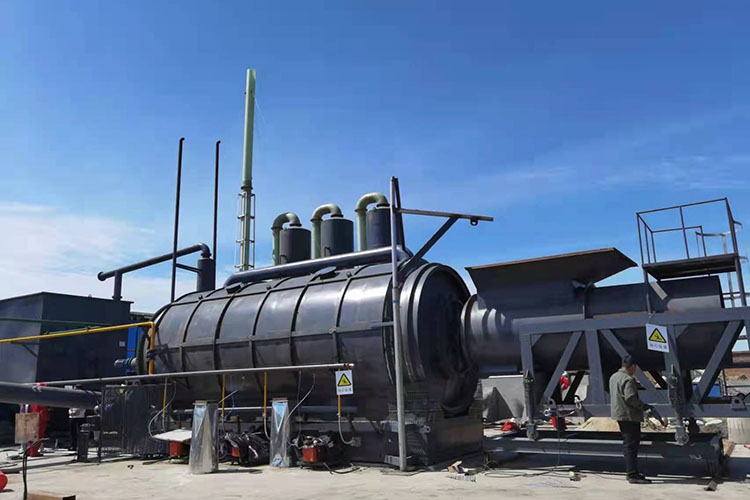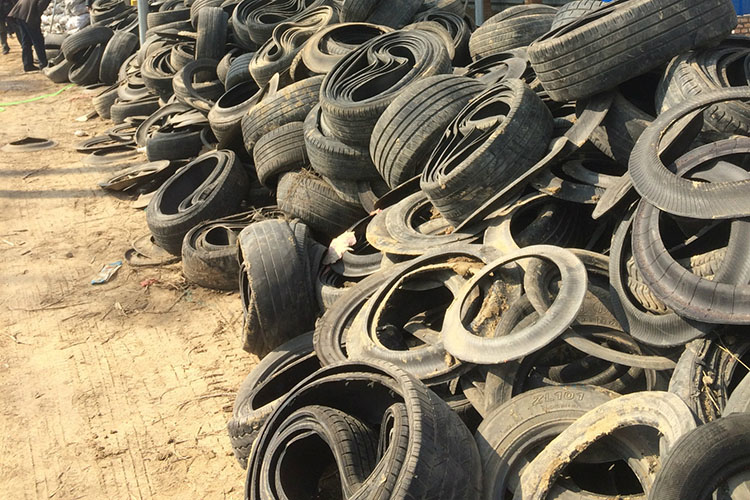Tire refining is a technological, environmentally friendly, and efficient waste resource utilization process aimed at converting waste tires into useful fuel oil and other by-products. The process involves multiple key steps, each of which plays an important role in ensuring that waste tires are effectively converted and minimizing environmental pollution.
Firstly, the first step in tire refining is the pretreatment stage. Waste tires need to undergo mechanical crushing before entering the refining equipment. This process prepares for the subsequent pyrolysis process by cutting waste tires into smaller pieces or particles. Mechanical crushing not only helps to reduce the volume of processed materials, but also makes the raw materials inside the tire more easily exposed to high temperatures and chemical treatments.

The subsequent decontamination stage is a crucial step in ensuring the cleanliness and efficient operation of the processed materials. The surface of tires often adheres to soil, grease, and other dirt, which not only affect the effectiveness of subsequent treatment processes but may also cause damage to equipment. Therefore, before pyrolysis, it is necessary to thoroughly clean and remove dirt from the waste tires to ensure the smooth progress of subsequent processing and product quality.
The pyrolysis stage is one of the core steps in the tire refining process. In high temperature and oxygen deficient environments, waste tire particles are heated to about 400 ° C to 600 ° C to undergo pyrolysis reactions. Under these conditions, organic matter in tire particles decomposes into gas and liquid products. These products include fuel oil, fuel gas, water vapor, and residual solid substances such as carbon black.
The generated gas and liquid products are condensed through a cooler. In the condenser, the fuel gas generated at high temperature rapidly cools and condenses into a liquid, namely fuel oil. The condensed liquid oil products usually contain various hydrocarbons and can be used as industrial fuels or other chemical raw materials. At the same time, the condensation process also helps to separate water vapor and other gases, purify fuel oil, and improve its quality.

The separation and processing stage is to further purify and separate fuel oil and other by-products. At this stage, different physical and chemical properties are utilized to separate the products. For example, carbon black and other solid waste can be separated from liquid oil through gravity separation or chemical treatment. After these processing steps, fuel oil is usually further filtered and purified to remove residual impurities and improve the purity and usability of the product.
The final post-processing and utilization stage involves treating and utilizing the remaining solid waste and wastewater. Through effective waste management techniques such as incineration or chemical treatment, the impact of solid waste on the environment can be reduced. At the same time, utilizing wastewater treatment technology to treat wastewater ensures that wastewater discharge meets environmental standards and reduces pollution to water resources.
Overall, tire refining is an environmentally friendly and economically efficient waste treatment and resource recovery technology. By converting waste tires into useful fuel oil and other products, not only does it effectively reduce the accumulation of solid waste and its impact on the environment, but it also provides a renewable resource source for the industrial and energy sectors. With the advancement of technology and the improvement of environmental awareness, tire refining technology is expected to play a more important and extensive role in the future, making positive contributions to sustainable development goals.
Yongle Environmental Protection is mainly engaged in the research and development, production and sales of complete sets of technical equipment for organic solid waste disposal and comprehensive utilization. Production and manufacturing, domestic waste treatment equipment, tire pyrolysis equipment, medical waste disposal equipment, hazardous waste disposal equipment, and achieve efficient and comprehensive utilization of resources through independently developed low-temperature anaerobic pyrolysis equipment technology solutions.
Tags:Processing steps for tire refining equipment,Tire refining,YONGLE GROUP
 Latest news
Latest news


























